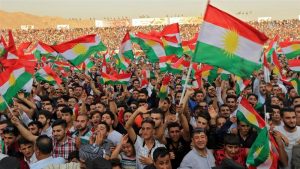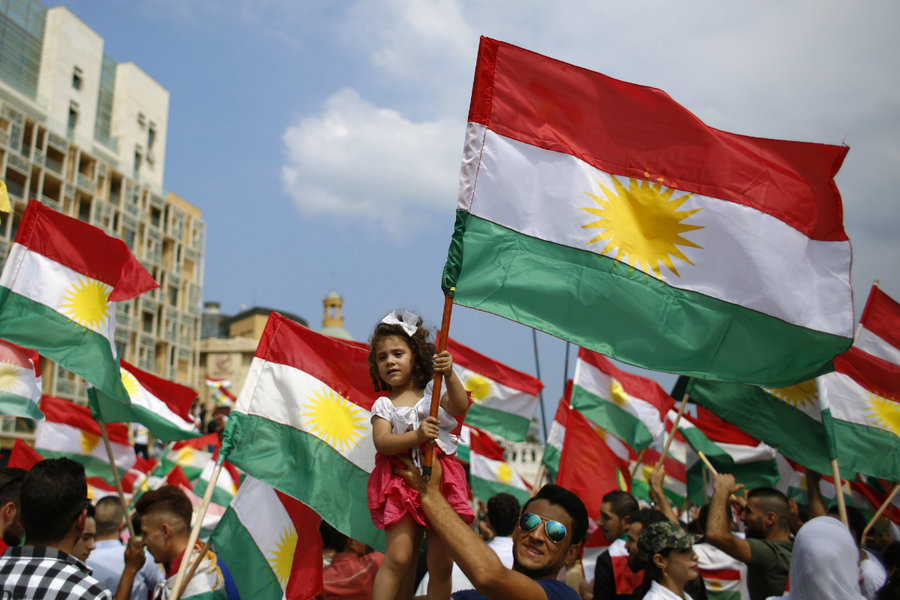By Christian Sullivan
In the center of the Iraqi city of Erbil, atop an oval hill built from generations living on the same exact location, lies the Erbil Citadel, the oldest continually inhabited place in the world and a UNESCO World Heritage Site. The Citadel is a miniature city on its own, with bazaars, gardens, mosques, and houses with spacious courtyards. Surrounding the Citadel is a wall dating from the nineteenth century, making it an impregnable fortress that has long stood against invaders. As a testament to the thousands of years of human history, the Erbil Citadel has seen much sociopolitical change in its existence, but remains impregnable to change. Today, sociopolitical change is once again occurring around Erbil, the capital of the autonomous region of Kurdistan and homeland of the Kurds.
The Kurds are an ethnolinguistic, cultural group that predominately live in the mountainous regions of northern Iraq, southern Turkey, and Iran. The Kurds have occupied this territory before 600 BCE, under multiple empires. When the Ottoman Empire fell after the First World War, the Kurds agitated for independence, citing US President Woodrow Wilson’s theory of national self-determination which stated that all ethnic groups should possess their own nation. Unfortunately for the nationalists, Kurdistan became part of the British Mandate of Iraq. As the largest ethnic group without a nation-state in the world, the Kurds have spent a century under the rule of various nations including Iraq and Turkey. However, when the United States invaded Iraq in 1991, the Kurds were granted the right to create their own autonomous government, the Kurdistan Regional Government (KRG), within Iraq’s federal system. With the rise of the Islamic State (ISIL) in 2014, the KRG implemented its own offensives separate from the Iraqi government to defend its people. The Pershmerga, the Kurdish militia, fought many campaigns against ISIL fighters with American aid, successfully repelling ISIL and liberating Iraq from ISIL control. By fighting this ostensible war of independence against ISIL, the Kurds feel that they have proven their ability to govern effectively enough to merit independence.

On September 25, 2017, the KRG held an independence referendum. Ninety-two percent of 3.3 million votes cast, both Kurd and non-Kurd, resoundingly voted for independence, ending the Kurds’ long struggle. With the resounding victory for the pro-independence movement, the KRG sought to begin negotiations with Baghdad to provide a clean secession. Pershmerga fighters have been dispatched to disputed areas such as Kirkuk to enforce the referendum’s results. Even though most of the population supports an independent Kurdistan, particularly in light of its success fighting ISIL, regional powers refuse to support such a proposal.
Various powers with interests in the Middle East have declared Kurdistan’s independence referendum illegitimate, demanding Kurdistan reunite with Iraq. Iraq, reeling from the fight against ISIS, refuses to recognize the referendum, calling on the KRG to cancel the referendum. After the referendum, the Iraqi government refused to facilitate talks, citing the danger to regional stability that an independent Kurdistan would create, and instead halted all international flights into the Sulaimaniyah and Erbil airports. Iraq has also amassed troops near the Kurdish border to control border crossings. As a nation that has battled many insurgencies from Kurdish separatists on its southeastern border, Turkey joined Iraq in refuting the independence referendum, threatening to place crippling oil restrictions on the Iraqi Kurds and conduct military action against them. This threat deals a severe blow to the Kurdish economy, which relies on crude oil revenues for its hard currency reserves. Supporting Turkey, a NATO ally, US Secretary of State Rex Tillerson labeled the referendum illegitimate, calling for a unified Iraq and offering to mediate dialogues between the Kurds and the Iraqis. Even though each regional power has different vested interests in Iraq, all parties involved condemned the referendum as a threat to stability in a region just reeling from the horrific violence of the Islamic State, blocking all paths to international recognition.
Once again, as in the aftermath of the First World War, Middle Eastern nationalists, emboldened by their successes against an oppressive and brutal enemy, stand ready to lead their people in their newfound freedom, but face obstacles from international factions such as Turkey. The Kurds, however, will remain as steadfast as the Erbil Citadel—the center of their homeland which remains unchanged even as the world rapidly changes. The Kurds will stand firm in their quest for national self-determination, proving to the world their resolve as a people worthy of self-government. Though the sun may set over the Erbil Citadel today as it has for thousands of years, the sun will never set on Kurdish independence, instead building upon the foundation and becoming a fortress more impenetrable than the Erbil Citadel.
